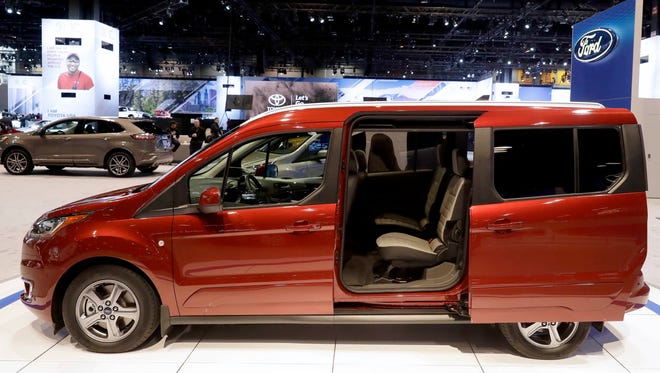This is a story about a backseat and lots of money.
So sit down and get comfortable because the detail reads like a film script.
Ford Motor Co. could face up to $1.3 billion in import penalties on its Ford Transit Connect vans, according to a document the automaker filed with the Securities and Exchange Commission on Thursday.
This is on top of a $196 million penalty Ford paid in 2020 to U.S. Customs and Border Protection related to Transit Connect, the company confirmed to the Free Press. The payment was treated as a special item in Ford financial documents.
The legal battle is part of a years-long tariff dispute in U.S. courts between Ford and federal customs officials that seems to be coming to a close with potentially painful consequences for the Dearborn automaker.
The tariffs involve Transit Connect vehicles used as cargo vans by customers. If the vans are purchased as passenger vans, they’re subject to a 2.5% tax; cargo vans are subject to 25% duty.

“The Transit Connect program was designed and executed to comply with long-standing tariff rules. Nonetheless, after the Supreme Court declined to rehear the case, Ford paid increased duties on vehicles that had previously been imported to the U.S., plus interest,” Ford spokesman Ian Thibodeau told the Free Press on Thursday. “We will rightly continue to vigorously defend Ford’s actions here and contest any (additional) duties and penalty.”
Ford is accused of strategically trying to skirt tariff laws.
The latest Ford filing with the federal regulatory agency is called a prepenalty notice that alerts investors to the financial vulnerability. The vans in question were built in Turkey.
Warning
After the company’s June 30, quarterly earnings period ended, Ford filed regulatory documents that noted the customs agency ruled in 2013 that “Transit Connects imported as passenger wagons and later converted into cargo vans are subject to the 25% duty applicable to cargo vehicles, rather than the 2.5% duty applicable to passenger vehicles.”
Ford challenged the ruling in the U.S. Court of International Trade, which ruled in Ford’s favor in August 2017. But then Customs appealed to the U.S. Court of Appeals for the Federal Circuit and prevailed in June 2019.
The U.S. Supreme Court denied Ford’s petition to hear the case on June 29, 2020, and the company paid increased duties for certain prior imports, plus interest, and disclosed to investors that Customs (CBP) might push for penalties.
On Thursday, Ford said in its regulatory filing that its prepenalty notice “includes a demand for additional duties of $181 million and indicates that CBP is contemplating the issuance of a claim for a monetary penalty. If such a claim is brought, CBP indicated that the penalty it may seek could be as much as $652 million to $1.3 billion. In the event a penalty is ultimately imposed against us, the amount would be based on our level of culpability as determined by the courts. We intend to vigorously defend our actions and contest payment of any amounts set forth in the prepenalty notice.”
Justice Department vs. Ford
The U.S. Justice Department determined Ford “designed, marketed, sold and delivered the van to consumers exclusively as a two-person cargo van. But to avoid the higher rate of duty that applies to cargo vans as compared to vans principally designed for passenger transport, petitioner imported each Transit Connect … with a temporary, cheap rear seat that was designed to be immediately removed as soon as the van cleared” Customs, according to Reuters.
The government noted the seats lacked head restraints and were “upholstered with cost-reduced fabric that did not match that of the front seats.”
Ford argued the rear passenger seat met all federal safety standards, had seat belts for every seating position, and anchors for the rear seats and seat belts and were “street-legal passenger vehicles,” Reuters said.
Automakers caught
The 25% tariff stems from an old trade war involving frozen chicken, and the larger tariff on cargo vehicles is known as the “chicken tax.”
“Since the creation of the ‘chicken tax’ in 1963, automakers have been finding ways to get around the 25% tariff on imported trucks,” said Sam Fiorani, vice president of global vehicle forecasting at AutoForecast Solutions.
“Toyota began putting beds on imported ‘incomplete’ pickup trucks in the early 1970s, making the ‘final assembly’ of the vehicle in the U.S.,” he said. “Other companies have followed including van producers who import vans with seats and windows, which makes them ‘passenger cars.’ “

Many of these wagons, including the Mercedes-Benz/Dodge Sprinter and Ram ProMaster City, are shipped in from Europe and taken to a North American “plant” where the seats and windows are removed, converting them to commercial vans, Fiorani explained.
In the past, Nissan fought the tariff on two-door SUVs, which it argued were passenger cars but the government treated as trucks. Nissan won that redesignation of the two-door Pathfinder, and other two-door SUVs, as passenger cars alongside their four-door counterparts, Fiorani noted.
“If Ford were to fight this and lose, Ford, Stellantis and Daimler would all be subject to retroactive tariffs of hundreds of millions of dollars,” he said. “Ford’s volume makes them the perfect first target for the SEC.”
More:Ford reports net income of $3.3B for first three months of 2021, still expects hit
More:Ford took $6B government loan in 2009 — and debt still haunts company
More:Ford’s plan to defer government loan payments a ‘concerning sign’
Ford already plans to make the next-generation Transit Connect in North America, Daimler started local assembly of the Mercedes-Benz Sprinter back in 2018, but the Ram ProMaster City is still being imported from Europe and current plans have it remaining in Europe, Fiorani said.
“If they were to lose, Ford would likely negotiate a lower fine in exchange for the promise to produce future models in North America, starting in 2023,” he said. “Stellantis, however, would need to find a way to relocate production of their small van at a North American plant.”
Thibodeau told the Free Press, “We don’t typically comment on future product plans.”
Contact Phoebe Wall Howard at 313-222-6512 orphoward@freepress.com.Follow her on Twitter@phoebesaid. Read more on Ford and sign up for our autos newsletter.